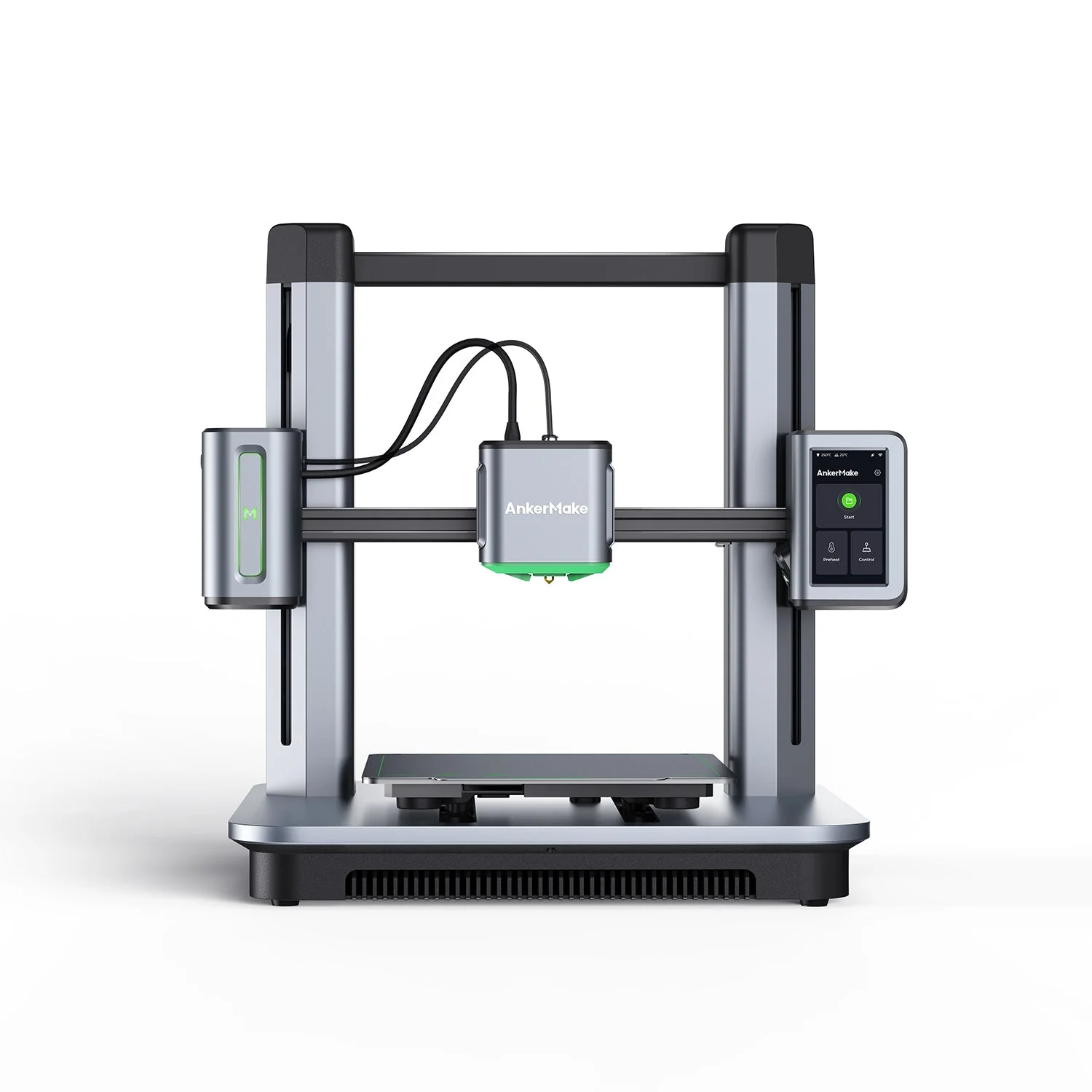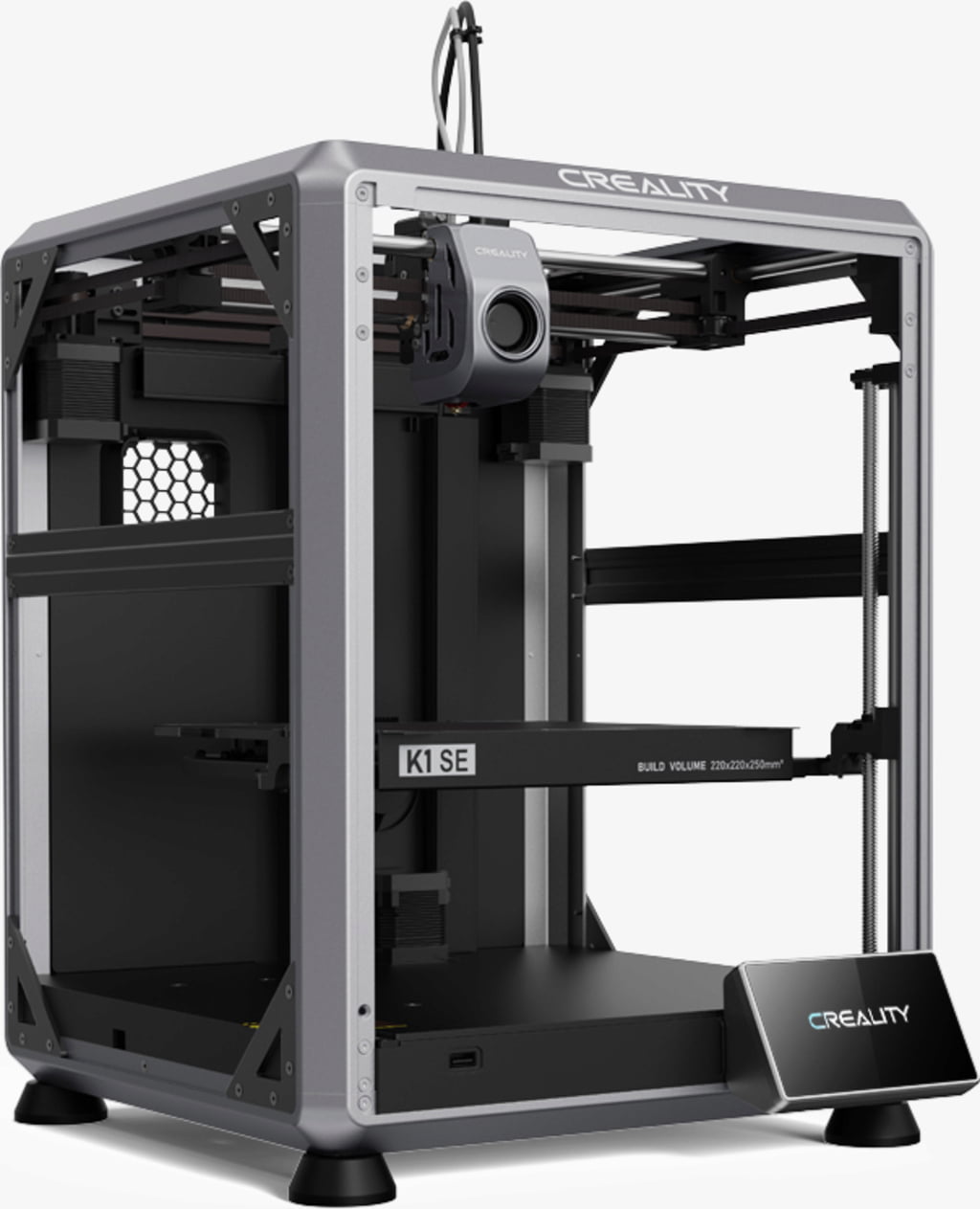Compare M5 vs K1 SE
Comparison between the best 3D printers
Choose the best 3D printer at the best price. The cheapest 3D printers are here.
Buy a 3D printer here with 3D Fila.
 |
 |
|
| Model | M5 |
K1 SE |
| Printing Material | Filament | Filament |
| Buy Filament for AnkerMake M5 | Buy Filament forCreality 3D K1 SE | |
| Estimated price | $497,00 | $349,00 |
| Manufacturer | AnkerMake | Creality 3D |
| Release Year | 2023 | 2023 |
| Print Volume [mm] | 235x235x250 | 220x220x250 |
| Printer Size [mm] | 502x438x470 | 355x355x480 |
| Weight [kg] | 12,6 | 10,24 |
| Power Loss Recovery | YES | YES |
| Enclosed printer | NO | NO |
| Bed Leveling | Automatic | Automatic |
| Filament End Sensor | YES | YES |
| Bed type | Heated | Heated |
| Power supply system | Direct Drive | Direct Drive |
| Standard nozzle | 0,4 | 0,4 |
| Maximum Nozzle Temperature [°C] | 260 | 300 |
| Maximum Bed Temperature [°C] | 100 | 100 |
| Maximum printing speed [mm/s] | 500 | 600 |
| Filament holder | YES | YES |
| Camera for supervision | YES | YES |
| Recommended filaments | PLA, PETG, ABS | Hyper PLA, PLA, PETG, PET, TPU |
| Recommended slicers | AnkerMake Studio (macOS, Windows), Simplify3D, Ultimaker Cura, PrusaSlicer | Creality Print; Cura, Simplify3D e PrusaSlicer |
| Maximum Resolution [mm] | 0,1 | 0,1 |
| Processor | ||
| Display | Touchscreen 4,3'' | Display touchscreen 4,3'' |
| Power Supply | 350 W | 110/220V / 350W |
| Connectivity | Wi-Fi, USB-C, OTA Upgrade | Ethernet / USB / Wi-Fi |
| Operating systems | Windows, Linux, Macbook | Windows, Mac, Linux |
| Date of registration in the system | 2024-07-08 | 2023-08-26 |
| Release date | 2023 | 2023 |
| Extra features | The AnkerMake M5 printer stands out for its impressive print speed, reaching up to 500mm/s. It features AI print monitoring, an integrated camera for creating timelapses, auto-leveling bed with pressure sensor, direct extruder, flexible PEI-coated build plate, and Wi-Fi and USB-C connectivity. Assembly is quick and easy, and the printer is designed to deliver high print quality and ease of use. | The Creality K1 SE is a high-speed 3D printer with CoreXY system, capable of printing at up to 600mm/s with acceleration of 20000mm/s². It has a dual-gear extruder, easy-to-replace tri-metal nozzle, automatic leveling, and advanced features such as vibration reduction algorithms and intelligent operation. Its rigid cast aluminum frame ensures stability, while the open-source Klipper-based system offers freedom for customization. It is pre-assembled for a simplified and fast user experience. |
| Support for multiple colors and materials (AMS and CFS) | NO | NO |
Notes * |
||
| Cost-benefit | 7 / 10 | 7 / 10 |
| Hardware | 3.5 / 10 | 3.5 / 10 |
| Tela | . | . |
| Print volume | 3 / 10 | 3 / 10 |
| Performance | 4 / 10 | 5 / 10 |
Conclusion |
| In comparing the AnkerMake M5 and the Creality K1 SE, both printers are solid choices for enthusiasts and professionals alike, released in 2023 with modern capabilities. The AnkerMake M5 impresses with its robust print speed of 500mm/s, coupled with features like AI print monitoring and an integrated camera, making it user-friendly for those looking to produce high-quality prints efficiently. Its design allows for quick assembly and ease of use, which can be appealing to beginners or those who prefer a less complicated setup. On the other hand, the Creality K1 SE takes the lead in speed capabilities, reaching an impressive 600mm/s, and is built on a CoreXY system, which enhances stability and performance. Features such as a dual-gear extruder and vibration reduction algorithms demonstrate its advanced engineering, catering to users who prioritize performance and customization options. When considering their respective prices, the K1 SE offers slightly more value in terms of speed and advanced features, potentially making it the better choice for those seeking cutting-edge performance at a more accessible price point. Conversely, the M5 may attract users who appreciate its unique features, ease of assembly, and reliability. Ultimately, the decision between the two will depend on individual priorities—whether one values speed and advanced capabilities or ease of use and a well-rounded feature set. Both printers offer an excellent cost-benefit ratio, making either a viable option for different types of users in the 3D printing community. |

